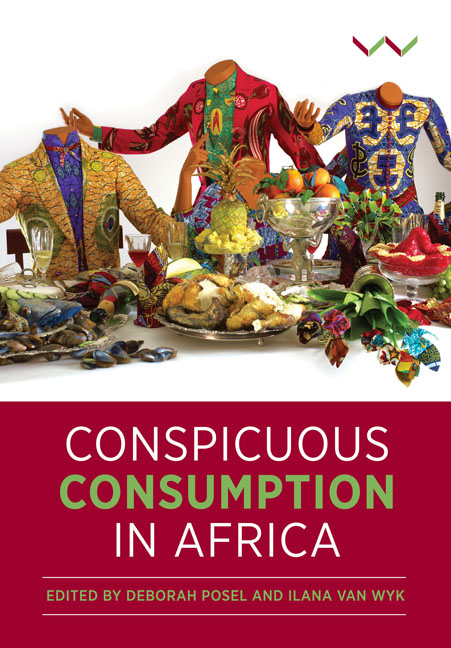Book contents
- Frontmatter
- Contents
- Acknowledgements
- List of Illustrations
- 1 Thinking With Veblen: Case Studies From Africa's Past and Present
- 2 Changes in the Order of Things: Department Stores and the Making of Modern Cape Town
- 3 Conspicuously Public: Gendered Histories of Sartorial and Social Success in Urban Togo
- 4 Etienne Rousseau, Broedertwis and the Politics of Consumption Within Afrikanerdom
- 5 Recycling Consumption: Political Power and Elite Wealth in Angola
- 6 Chiluba's Trunks: Consumption, Excess and the Body Politic in Zambia
- 7 Jacob Zuma's Shamelessness: Conspicuous Consumption, Politics and Religion
- 8 Precarious ‘Bigness’: a ‘Big Man’, His Women and His Funeral in Cameroon
- 9 Young Men of Leisure? Youth, Conspicuous Consumption and the Performativity of Dress in Niger
- 10 Booty on Fire: Looking at Izikhothane With Thorstein Veblen
- 11 Conspicuous Queer Consumption: Emulation and Honour in the Pink Map
- 12 The Politics and Moral Economy of Middle-Class Consumption in South Africa
- 13 Marigold Beads: Who Needs Diamonds?!
- Contributors
- Index
1 - Thinking With Veblen: Case Studies From Africa's Past and Present
Published online by Cambridge University Press: 29 October 2019
- Frontmatter
- Contents
- Acknowledgements
- List of Illustrations
- 1 Thinking With Veblen: Case Studies From Africa's Past and Present
- 2 Changes in the Order of Things: Department Stores and the Making of Modern Cape Town
- 3 Conspicuously Public: Gendered Histories of Sartorial and Social Success in Urban Togo
- 4 Etienne Rousseau, Broedertwis and the Politics of Consumption Within Afrikanerdom
- 5 Recycling Consumption: Political Power and Elite Wealth in Angola
- 6 Chiluba's Trunks: Consumption, Excess and the Body Politic in Zambia
- 7 Jacob Zuma's Shamelessness: Conspicuous Consumption, Politics and Religion
- 8 Precarious ‘Bigness’: a ‘Big Man’, His Women and His Funeral in Cameroon
- 9 Young Men of Leisure? Youth, Conspicuous Consumption and the Performativity of Dress in Niger
- 10 Booty on Fire: Looking at Izikhothane With Thorstein Veblen
- 11 Conspicuous Queer Consumption: Emulation and Honour in the Pink Map
- 12 The Politics and Moral Economy of Middle-Class Consumption in South Africa
- 13 Marigold Beads: Who Needs Diamonds?!
- Contributors
- Index
Summary
Thorstein Veblen (2003 [1899]) coined the phrase ‘conspicuous consumption’ in his critique of nineteenth-century American society, as an indictment of the extent to which the need for personal recognition – or ‘honour,’ as he put it – was vested in public displays of material acquisition. The phrase immediately caught on, infiltrating vocabularies of social commentary and popular conversation in the United States of America (USA) and beyond. In the present moment, more than a century later, it has self-evident resonance with experiences of ostentatious accumulation across the world.
There are some striking resemblances between the USA of the late nineteenth century, about which Veblen was writing, and many parts of the world today – including Africa: buoyant if uneven economic growth; rampant and loosely regulated accumulation; rapid upward mobility in the higher reaches of society coupled with abiding or deepening poverty and marginality for most; insufficient government action to manage or ameliorate the inequalities. The ‘Africa Rising’ narrative informs some of these trends on the continent. From the early 2000s, a number of influential authors, publications and institutions, including The Financial Times, The Economist, the BBC and The International Monetary Fund, have reported that growing access to the Internet and mobile phones (Mutiga & Flood 2016), an increase in consumer spending and growth in entrepreneurship have marked a new epoch of rapid economic growth across the African continent (Mahajan 2009; Taylor 2014). Combined with the rise of a new middle class, there has been much optimism that this unprecedented growth would translate into increasing incomes across the continent. Critics have pointed out, however, that Africa's ‘rise’ has not translated into economic democracy, and the small ‘middle class’ appears more interested in its own meteoric rise and conspicuous consumption than in economic justice (Akwagyiram 2013; Fabricius 2015; Johnson 2015; Wadongo 2014).
As inequalities on the continent deepen, conspicuous consumption has become both the sign of such differentiation and the symbolic register within which much political, social and cultural criticism is couched (Dosekun 2015; Iqani 2016; Mbembe 2004; Spronk 2014). In global news on Africa, conspicuous consumption is often central to the ways in which controversial public figures and events are construed. Consider, for example, the ousting of former Zimbabwean president Robert Mugabe in 2017.
- Type
- Chapter
- Information
- Conspicuous Consumption in Africa , pp. 1 - 24Publisher: Wits University PressPrint publication year: 2019



